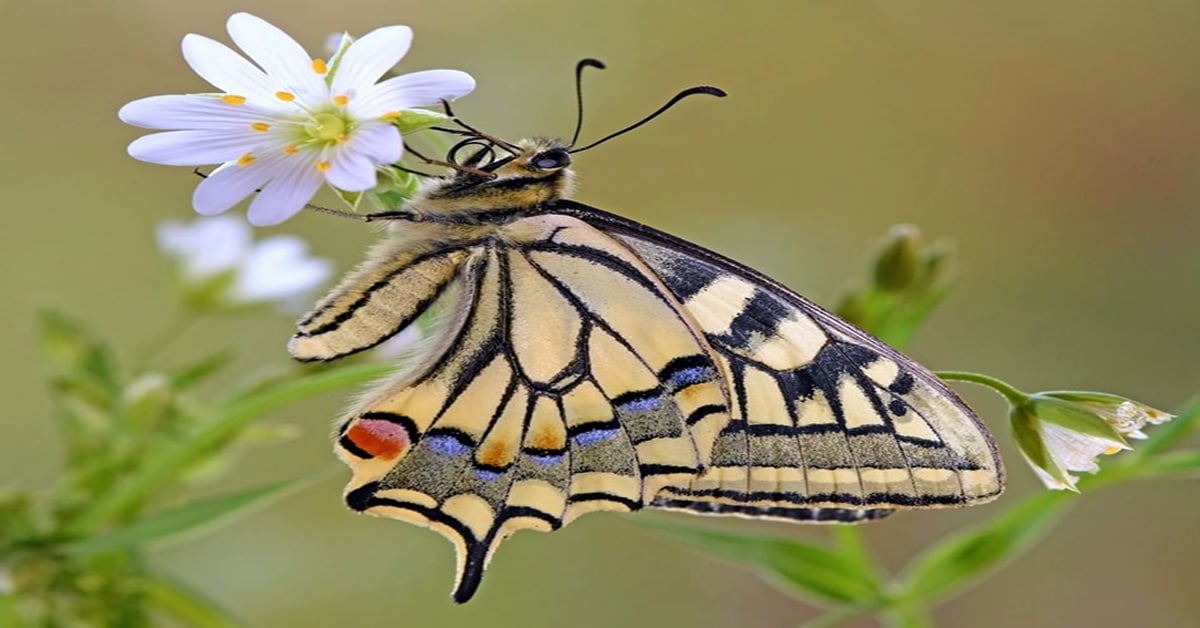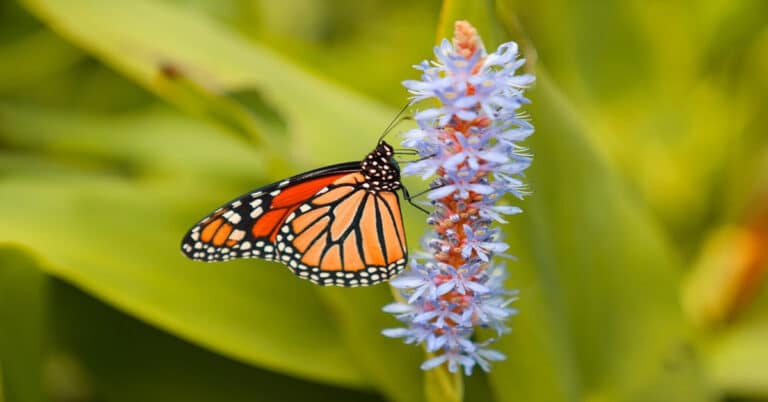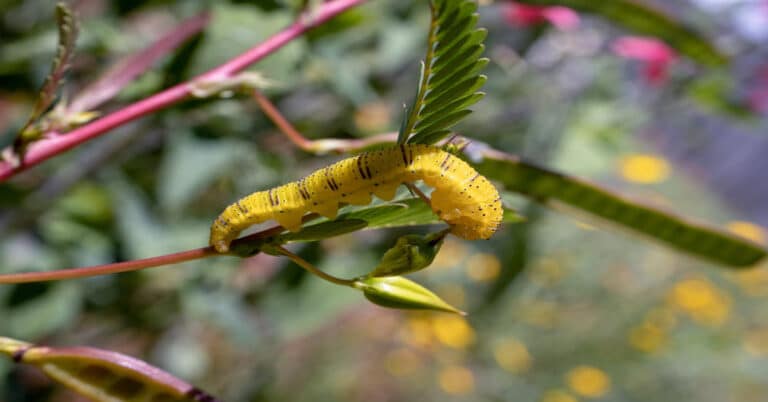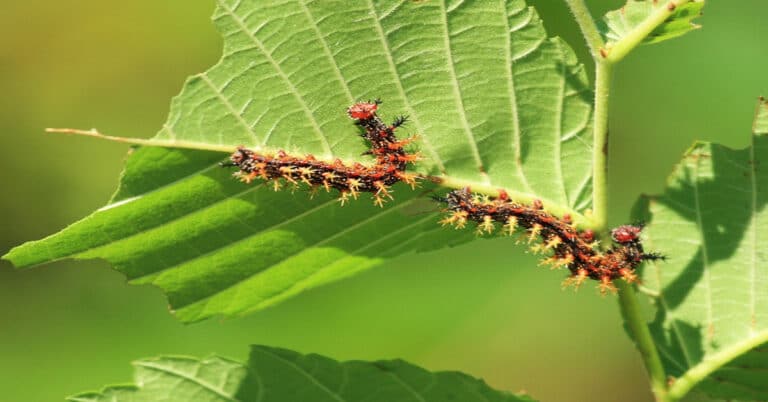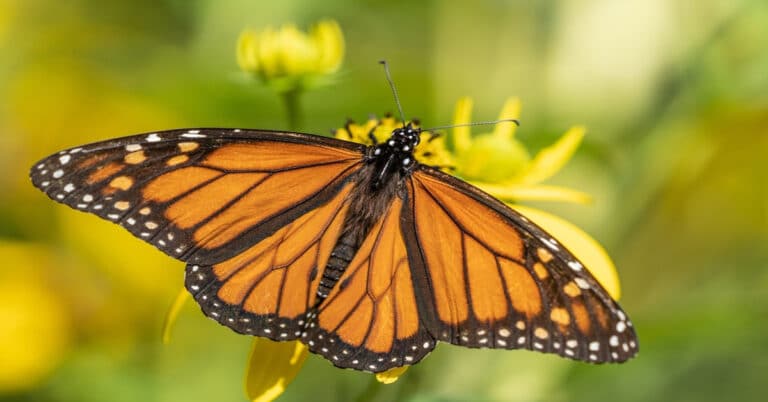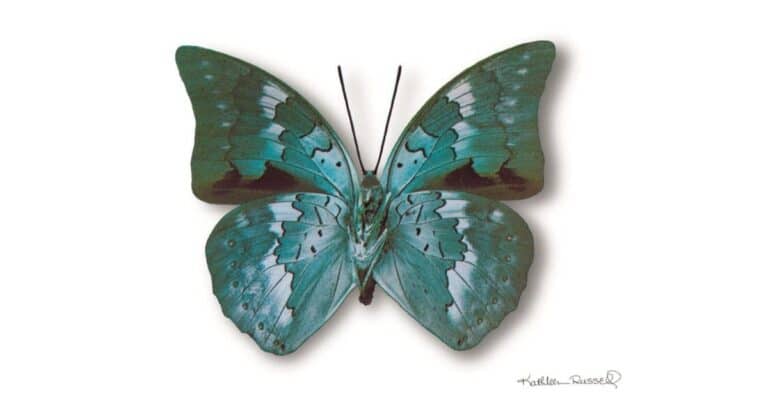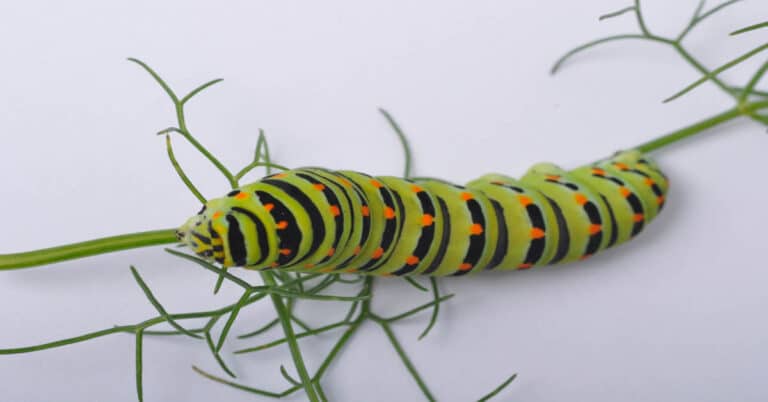Raising Butterflies: Butterfly Kits for Children
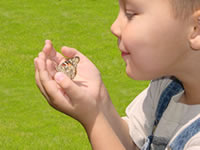
The Educational Experience of Raising Butterflies:
Children like to keep pets. They learn responsibility from keeping pets. They can learn a lot about insects by raising a butterfly. Raising butterflies is truly an educational experience that every child will want to do over and over again. You can take the kids on a hike to search for butterfly eggs and collect them, then make a home for them so you can observe their development. OR you can make it easy on yourself and buy butterfly kits for children to raise Painted Lady Butterflies.
Monarch Butterflies are easy to rear in an outdoor butterfly garden. You might want, or a school or club project might require you, to rear butterflies in an indoor cage. So, for a child’s first venture into rearing butterflies indoors, we want a hardy native species that can thrive in most of North America and that can tolerate crowded conditions. Monarch Butterflies like lots of space, but a butterfly that tolerates crowded conditions does exist. We like the Nature Gift Store’s Painted Lady butterfly kits for children.(ages 4 and older). Though each individual Painted Lady Butterfly’s life is short, sharing it can be great fun and very educational.
Order butterflies online (below) from one of the largest butterfly kit suppliers in the country. We like Nature Gift Store, who specializes in Painted Lady butterfly kits for children. Ages 4+.
Complete Butterfly Kit — Painted Lady Butterflies
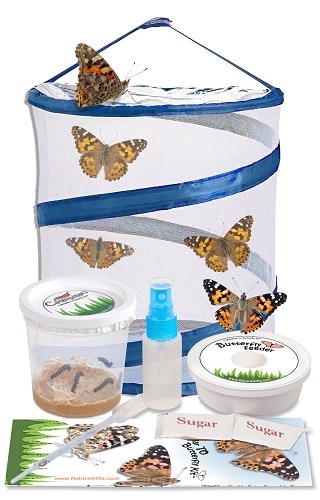 Painted Lady Butterfly Kit With 5 Caterpillars and Small Pop-Up Habitat Painted Lady Butterfly Kit With 5 Caterpillars and Small Pop-Up Habitat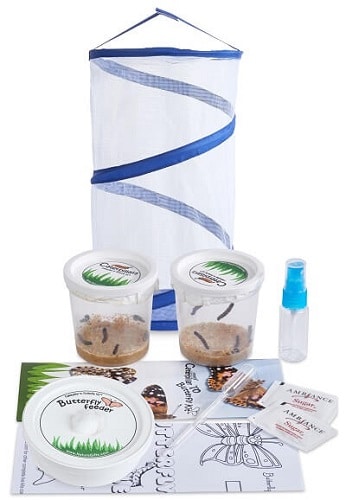 Painted Lady Butterfly Kit With 10 Caterpillars and Large Pop-Up Habitat Painted Lady Butterfly Kit With 10 Caterpillars and Large Pop-Up Habitat | Grow your own butterflies and witness their amazing life cycle close-up with the Caterpillar to Butterfly Kit.
Kit with 5 LIVE Caterpillars SENT NOW Kit with 10 LIVE Caterpillars SENT NOW Kit with FREE Certificate For 5 Caterpillars LATER Kit With FREE Certificate For 10 Caterpillars LATER School Kit with 32 LIVE Caterpillars SENT NOW |
REFILL ONLY for Painted Lady Butterfly Kit
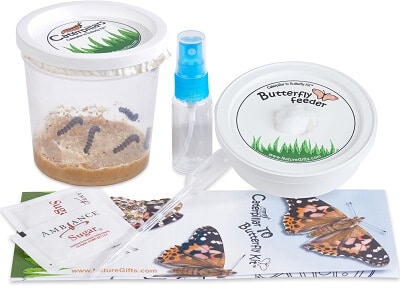 Caterpillar Refill Kit With 5 Caterpillars Caterpillar Refill Kit With 5 Caterpillars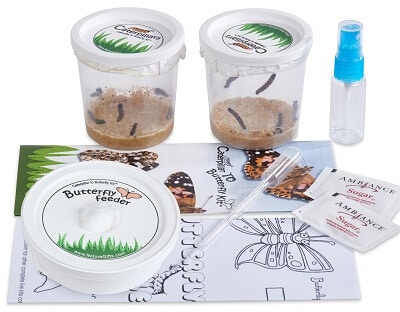 Caterpillar Refill Kit With 10 Caterpillars Caterpillar Refill Kit With 10 Caterpillars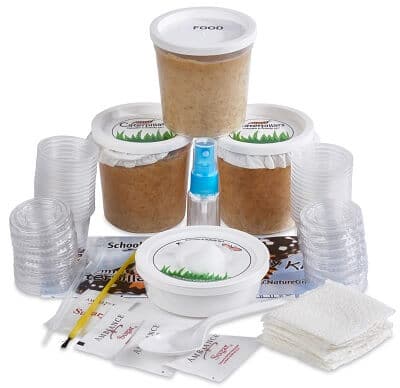 Caterpillar Refill Kit With 32 Caterpillars Caterpillar Refill Kit With 32 Caterpillars | Are you ready to rear butterflies again? Painted Lady Caterpillar Refill Kit will allow you to grow butterflies one more time and enjoy the wonderful process of metamorphosis. Everything you’ll need for a successful butterfly-growing project has been provided in this kit, except for the butterfly habitats.
5 LIVE Caterpillars: REFILL ONLY (All Except the Habitat) 10 LIVE Caterpillars: REFILL ONLY (All Except the Habitat) 32 LIVE Caterpillars: School Size REFILL ONLY (All Except the Habitat) |
Read some interesting Monarch and Painted Lady Butterfly comparisons below these tables:
Monarch and Painted Lady Facts and comparisons:
These kids got to observe live Painted Lady caterpillars turn into Butterflies.
Painted Lady Butterflies, Vanessa cardui, look quite different from Monarch Butterflies, but they are fairly large and conspicuous, have orange and brown wings, and drink nectar from wild flowers like milkweed. From time to time someone watching them from a distance mistakes them for Monarchs. They are thought to be more closely related to the Viceroy Butterfly, which resembles the Monarch enough to confuse even careful observers at a distance. Though Painted Ladies go through the same life stages Monarchs do, they’re smaller, and have spots rather than stripes on their wings.
How long do Painted Lady Butterflies live? Altogether, about two months.
Can you tell whether Painted Lady Butterflies are male or female? It’s not as easy as it is with some species. Individuals’ color markings vary. However, male butterflies have longer abdomens while females’ abdomens are rounder, and only females flit around the undersides of leaves (laying eggs).
Teachers can buy a live School Size Painted Lady Butterfly raising kit.
Like Monarchs, Painted Ladies are “brush-footed” butterflies. They have six legs, but the foremost pair of legs are much shorter than the other legs.
When they want to relocate Painted Ladies may fly thirty miles an hour and travel a hundred miles in a day. They like an open sunny habitat with a variety of flowers, including some of the same species Monarch Butterflies prefer, such as cosmos and ironweed, as well as thistles. Individual butterflies fly for 10 to 24 days.
Painted Ladies are sometimes called Cosmopolitan Butterflies because some species of Vanessa is found in most of the world. They are among the most popular British butterflies in America. Vanessa virginiensis, the American Painted Lady; Vanessa annabella, the West Coast Lady; and Vanessa kershawi, the Australian Painted Lady, are hard to distinguish from Vanessa carduiin places where their ranges overlap.
While artists draw Painted Lady Butterfly pictures by studying photographs, there is a traditional, stylized Painted Lady Butterfly quilt pattern.
Painted Lady Butterfly life cycle:
Female Painted Lady Butterflies lay tiny, greenish eggs on their food plants. Depending on the weather, the eggs may hatch in three to five days.
Painted Lady Butterfly caterpillars mature through five instars, in each of which they grow out of one skin into another. They can complete the whole cycle in less than two weeks. Spiky skins make them harder for predators to swallow. Although they mimic some other caterpillars that have venomous spines, Painted Lady larvae do not sting or even stab human hands.
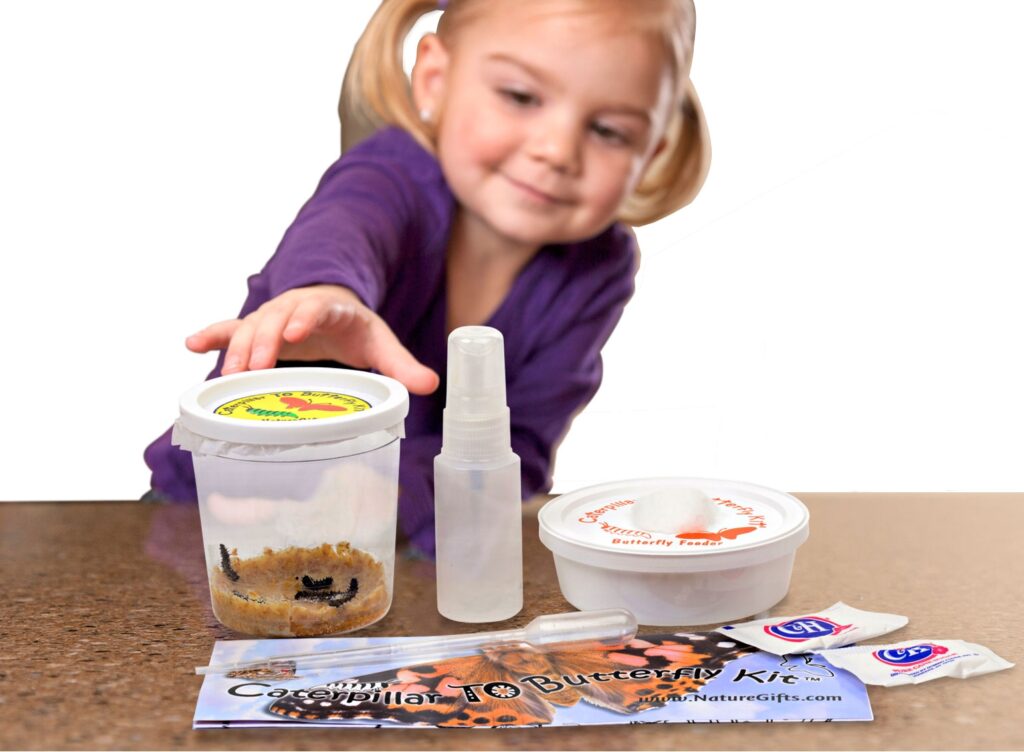
Like Monarchs, Painted Lady caterpillars eat common roadside weeds. They can eat at least 300 different plants, such as asters, hollyhocks, burdock, mugwort, sunflowers, and sagebrush. Occasionally they even eat crops like soy, mint, or canola, but they don’t like these plants enough to become farm pests. Their favorite food plants are thistles.
Although Painted Lady larvae don’t spin cocoons, sometimes they do spin silk tents for shade and protection. You might see a little mat of silk on a leaf a caterpillar is eating.
Painted Lady Butterflies pupate in a solid outer skin called a chrysalis. These can look tan, gray, or brown. Pupae take seven to ten days to turn into adult butterflies.
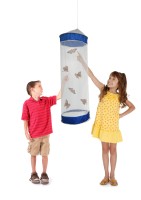
Most Painted Lady Butterfly adults do not have a regular migration cycle. Individual butterflies “migrate” in search of food, mates, or more favorable climate conditions. A male Painted Lady Butterfly will normally mate with several females and spend much of his adult life pursuing them. However, in California, it’s possible to speak of Painted Lady Butterflies having a multi-generation migration cycle, as individuals fly southward in autumn and northward in spring. In some places, like Sacramento, butterfly and nature watchers celebrated the Painted Lady Butterflies’ migration north from the Mojave Desert to Colorado in 2019.
Painted Lady Butterfly kits:
If you order Painted Lady Butterfly larvae from the Nature Gift Store, you’ll get five little caterpillars in a cup. (You can order more than one cup.) If you rear them at suitable temperatures and follow instructions, they guarantee a replacement if three of the five caterpillars don’t grow up to become adult butterflies.
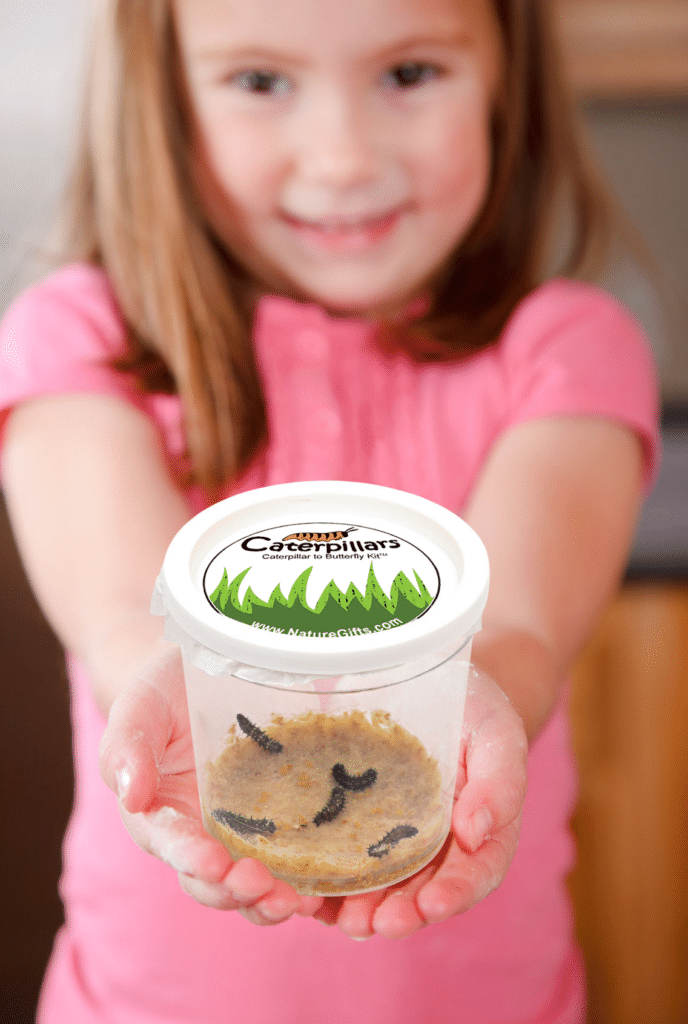
The five little black caterpillars come with the food they need to grow into bigger caterpillars, chrysalis, and then turn into butterflies. After release, if adult Painted Lady Butterflies find food, mates, and places to lay eggs in your butterfly garden, they may stay for a week or longer.
When should you release Painted Lady Butterflies? Adult butterflies will try to fly fairly soon after they emerge from the chrysalis. They can be released outdoors if temperatures are above 55 degrees Fahrenheit (12.8 Celsius). If you need to keep them indoors, you can offer a sugar solution or fresh-cut fruit like watermelon slices, or plan ahead and offer them fresh unsprayed flowers. Plants Painted Lady Butterflies eat, like the butterflies, are easy to rear when the weather is not too cold.
You can order butterflies online from one of the largest butterfly kit suppliers in the country. We like Butterfly & Nature Gift Store, which specializes in Painted Lady butterfly kits for children.

Having discovered a fondness for insects while pursuing her degree in Biology, Randi Jones was quite bugged to know that people usually dismissed these little creatures as “creepy-crawlies”.

